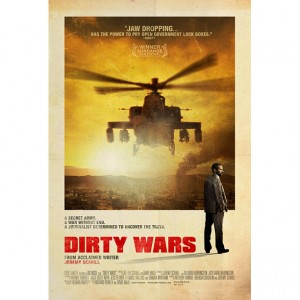You may want to slit your wrists after watching the documentary Dirty Wars; at the very least you will hang your head in shame at the egregious missteps made by the United States in its global struggle against terrorism. The U.S. military uses the term “collateral damage” to describe the thousands of innocent civilians who have been killed by U.S. troops in Afghanistan, Iraq, Pakistan and several other, “undeclared war” locales, but the euphemism can’t alter the true meaning of the term. Even accepting that a new paradigm of warfare exists in the 21st Century does not excuse the wholesale slaughter of innocents. Equally importantly, the policy is counterproductive, turning the very people we need to win over against us.
Jeremy Scahill, a national security correspondent for the Nation magazine and the author of Blackwater: The Rise of the World’s Most Powerful Mercenary Army, is the co-writer and narrator of Richard Rowley’s riveting documentary Dirty Wars, which exposes the covert fight being waged by the United States across parts of the Middle East, Asia and North Africa. Scahill was investigating a middle-of-the-night raid at a house in the Afghan town of Gardez — which left an American-trained Afghani police commander, two pregnant women and several children dead — when, in the process, he uncovered a much larger story: the existence of a secret military unit known as the Joint Special Operations Command (JSOC) that essentially has been granted a license to kill by the White House.
One survivor of the Gardez massacre recorded the aftermath of the raid on his cell phone. Men with American accents –- described by witnesses as bearded and not in uniform — are distinctly heard discussing how to cover their tracks. One way was by digging the bullets out of the bodies of their victims. The U.S. military and government stonewalled Scahill, but a United Nations investigation confirmed U.S. involvement. Once the incident could not be refuted, a second video surfaced, showing an American admiral apologizing to the family. Faulty intelligence was blamed.
But the damage had been done –- not only in the loss of innocent lives but also in the attitude of the once pro-American villagers, who state that such errors are commonplace. In one particularly busy week, claims Scahill, American troops staged 1700 night raids. The number of dead is not known; nor is there any indication of how many of those killed were actual terrorists –- or, as happened in Gardez, cases of mistaken identity. One survivor of the Gardez attack says bitterly, “After that raid I wanted jihad against the Americans.” Another laments, “in the mountains the night belongs to the Taliban. We now call these bearded Americans the ‘American Taliban.’”
The officer who made the apology was Vice-Admiral William McRaven, whom Scahill learns was appointed to lead JSOC when the unit was formed in 2008 by a secret presidential order from President Obama. The unit’s identity became public after the raid that killed Osama bin Laden. The group was also responsible for the drone strike that killed Anwar al-Awlaki, the American-born Islamic cleric. Two weeks after that death, in a case of faulty intelligence, Al-Awlaki’s 16-year old, American-born son was also targeted in a drone strike.
Dirty Wars steps outside the bounds of traditional investigative journalism by also focusing on Scahill’s dogged attempts to uncover the story of JSOC, which included his decision to testify before a Congressional Sub-Committee about the Gardez killings and the military’s attempts to cover up the incident. His efforts met with little interest; only one Congressman even bothered to show up at the hearing. The documentary also suggests the emotional toll that reporting on these and other events has taken on Scahill.
The grim material and gruesome images contained in this documentary are difficult to watch, but they are essential viewing for Americans who care about the principles on which our nation was founded and who consider morality a necessary component of American foreign policy, even in our increasingly, morally ambiguous age.
